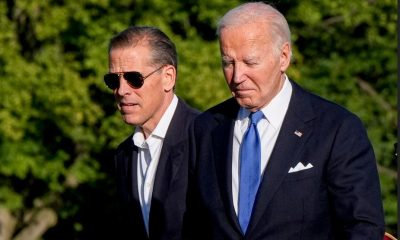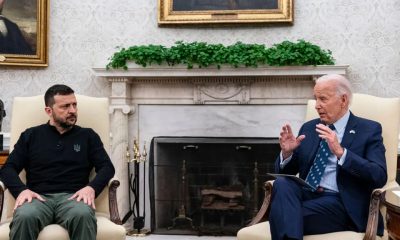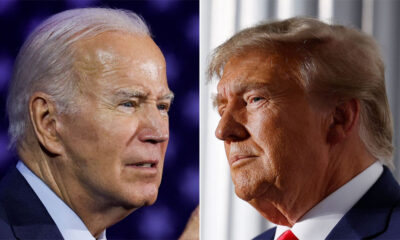International
Biden calls Putin a ‘war criminal’

President Biden explicitly called Russian President Vladimir Putin a “war criminal” Wednesday, after weeks of avoiding the term and at a time when his administration is still determining whether that label officially applies.
Biden made the dramatic accusation seemingly off the cuff, in response to a reporter’s shouted question at an afternoon event on an entirely different topic. “I think he is a war criminal,” Biden said, after delivering comments on the reauthorization of the Violence Against Women Act.
The asseveration was emblematic of the day’s high emotions and dramatic agenda, which were driven by a forceful speech to Congress delivered by Ukrainian President Volodymyr Zelensky, rather than by Biden’s own carefully laid plans and message.
Biden watched Zelensky’s 9 a.m. address from the private library of his White House residence, absorbing an emotional plea that invoked both Pearl Harbor and Sept. 11 — two deadly attacks on the United States that came from the sky — and beseeched the president to close the skies above Ukraine.
“Our country experienced the same every day, right now, at this moment, every night for three weeks now,” Zelensky said, speaking to lawmakers via video with the help of an interpreter.
Almost exactly four hours later, Biden responded with own remarks praising Zelensky’s “passionate” and “significant” speech, outlining the help his administration is providing Ukraine and announcing significant new aid. But he also made clear that the crux of Zelensky’s appeal — a no-fly zone above Ukraine — remains a nonstarter for the United States.
READ ALSO:
- Gunmen kill 2 prison officers in Imo
- Bandits Bow To Superior Firepower Of Soldiers In Benue
- 2023: PDP Presidential Aspirants To Pay N40m For Forms
Biden’s comments, which began more than an hour after initially scheduled and ran half the length of Zelensky’s entreaty — eight minutes to Zelensky’s 16 — underscored the fluid dynamic between the two leaders, with Biden (wearing a suit, subdued, age 79) finding himself, for one of the first times since Russia invaded Ukraine, clearly in response mode to Zelensky (clad in military green, resolute, age 44).
“The American people are answering President Zelensky’s call for more help, more weapons for Ukraine to defend itself, more tools to fight Russian aggression,” Biden said.
His comments at times took on an almost defensive tone, as he noted that the United States had been equipping Ukraine since before the invasion, that American weapons have helped the Ukrainians inflict significant damage and that the $800 million in new aid he was announcing would include “cutting-edge systems” such as drones.
Starting with Russia’s initial buildup on the Ukrainian border last fall, Biden and his team took the lead in trying to avert Russian aggression against its neighbor. The administration worked with NATO and other Western allies to deter Putin through diplomatic channels and the threat of sanctions. And Biden himself signed off on a new strategy to declassify intelligence, sharing it with the world in an attempt to thwart Putin’s ability to use a false pretext to invade Ukraine.
The White House even launched a secretive “Tiger Team” to plan for how to handle a Russian invasion.
Indeed, if Russia’s bellicosity offered any silver lining, it was that Putin helped catapult Biden back into a position in which he is most comfortable, serving as a transatlantic leader and declaring — both literally and symbolically — that America is back after four years of chaos and alliance-busting under Donald Trump.
But since the actual war between Russia and Ukraine began three weeks ago, Biden and his European counterparts have articulated no clear end game, and Wednesday’s Biden-Zelensky juxtaposition offered something of a split screen, with the U.S. president and his team trying to explain why the administration was falling short on meeting Zelensky’s stirring request.
The Ukrainian leader ended his speech by switching to English and calling out Biden directly: “You are the leader of the nation, of your great nation,” Zelensky said. “I wish you to be the leader of the world. Being the leader of the world means to be the leader of peace.”
In response, Biden found himself explaining at great length what he has already done to support Ukraine and announcing that he is authorizing an additional $800 million in security assistance, noting that it brought the total to $1 billion “just this week” and to $2 billion since the start of his administration.
READ ALSO:
- We’ve restored collapsed power grid – Minister
- LASTMA cautions over truck stuck under Lagos bridge
- Police detain officer for masterminding Delta GO’s escape
- Zelenskyy seeks US Congress help to fight Russia invasion
“This new package on its own is going to provide unprecedented assistance to Ukraine,” Biden said. “It includes 800 antiaircraft systems to make sure the Ukrainian military can continue to stop the planes and helicopters that have been attacking their people and to defend the Ukrainian airspace. And at the request of President Zelensky, we have identified and are helping Ukraine acquire additional longer-range antiaircraft systems and the munitions for those systems.”
The White House reported that the $800 million in new assistance includes 800 Stinger antiaircraft systems; 2,000 Javelin, 1,000 light anti-armor weapons, and 6,000 AT-4 anti-armor systems; 100 Tactical Unmanned Aerial Systems; 100 grenade launchers, 5,000 rifles, 1,000 pistols, 400 machine guns and 400 shotguns; more than 20 million rounds of small-arms ammunition and grenade launcher and mortar rounds; 25,000 sets of body armor; and 25,000 helmets.
Speaking to reporters Wednesday, White House press secretary Jen Psaki was repeatedly pressed on why the administration has been willing to provide Ukraine lethal assistance, such as Javelin antitank missiles and Stinger surface-to-air missiles, while repeatedly refusing Zelensky’s requests for Polish MiG fighter jets.
The administration has sought to draw a careful line between defensive and offensive weapons, arguing that the latter risked setting off a direct confrontation with Russia that could turn into a larger war.
“I would note that the equipment that we’ve provided is defensive, as you know, not offensive,” Psaki said. “And we see that as being a difference.”
And again, several minutes later, Psaki offered: “Javelins and Stingers are defensive weapons. MiGs or planes are offensive weapons, which are a different type of military system.”
But Poland has offered to provide fighter planes to the United States for use in Ukraine, a notion that has some bipartisan support on Capitol Hill. Immediately after Zelensky’s speech, several Republican lawmakers weighed in with calls for the Biden administration to send Zelensky the MiGs he wants.
“Zelensky has the courage of his convictions. The question he asked the Congress and the United States government is will we have the courage of ours,” said Sen. Ben Sasse (R-Neb.). “We’re a superpower — we should act like it.”
Asked about a no-fly zone, Sasse added: “We should have gotten them planes long ago.”
And referring to a video Zelensky showed Congress that included footage of his country being decimated, Sen. Susan Collins (R-Maine) offered a similar assessment.
“I don’t know how anyone could listen to him and see the videos and not be in favor of sending the MiGs, sending drones, sending additional weaponry, ceasing doing business in Russia and implementing his call for broader sanctions,” Collins said.
As for Biden’s unexpected comment that Putin is a war criminal, Psaki depicted it as a heartfelt remark. “The president’s remarks speak for themselves,” she said. “He was speaking from his heart and speaking from what we’ve seen on television, which is barbaric actions by a brutal dictator through his invasion of a foreign country.”
She reiterated Wednesday that the State Department is conducting a legal review to determine whether the actions in Ukraine are war crimes. “If Russia is intentionally targeting civilians, that would be a war crime,” she said last week in disclosing the inquiry. “But we need to go through the legal assessment and review in order to make a formal conclusion.”
Vice President Harris endorsed a war crimes inquiry last week, speaking during a visit to Poland, saying, “Absolutely there should be an investigation, and we should all be watching.” And in The Hague, the prosecutor’s office at the International Criminal Court recently announced that it was looking into the Ukraine situation.
But neither the international court nor the U.S. government has formally concluded that Russia’s actions constitute war crimes, making Biden’s seemingly spontaneous assertion Wednesday all the more striking.
Psaki emphasized that the administration has been in regular contact with the Ukrainians, saying that while Biden is not prepared to accede to every demand by Zelensky, nothing the Ukrainian leader requested came as a surprise.
“If we were President Zelensky, we would be asking for everything possible as well, and continuing to ask for it,” Psaki said. “Because he is watching his country and his people be attacked and brutalized by President Putin and the Russian military,” Psaki said.
THE WASHINGTON POST
International
Syria not threat to world, rebel leader al-Sharaa tells BBC
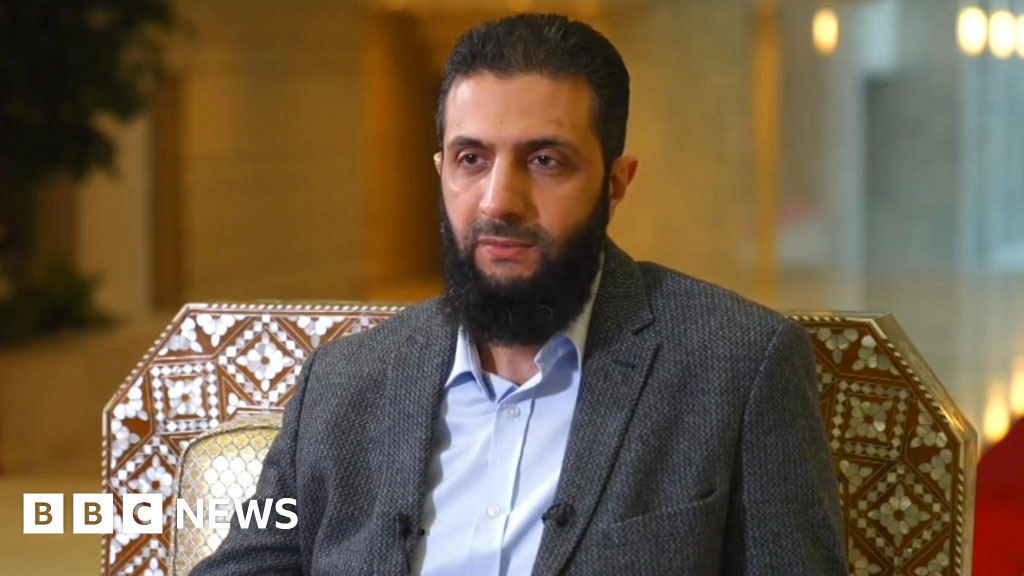
Syria not threat to world, rebel leader al-Sharaa tells BBC
The de facto leader of Syria, Ahmed al-Sharaa, has said the country is exhausted by war and is not a threat to its neighbours or to the West.
In an interview with the BBC in Damascus, he called for sanctions on Syria to be lifted.
“Now, after all that has happened, sanctions must be lifted because they were targeted at the old regime. The victim and the oppressor should not be treated in the same way,” he said.
Sharaa led the lightning offensive that toppled Bashar al-Assad’s regime less than two weeks ago. He is the leader of the Hayat Tahrir al-Sham (HTS), the dominant group in the rebel alliance, and was previously known by his nom de guerre of Abu Mohammed al-Jolani.
He said HTS should be de-listed as a terrorist organisation. It is designated as one by the UN, US, EU and UK, among many others, as it started as a splinter group of al-Qaeda, which it broke away from in 2016.
Sharaa said HTS was not a terrorist group.
They did not target civilians or civilian areas, he said. In fact, they considered themselves to be victim of the crimes of the Assad regime.
He denied that he wanted to turn Syria into a version of Afghanistan.
READ ALSO:
- Tinubu’s 2025 budget will increase poverty, worsen economy – PDP
- Real Madrid outclass Pachuca to win FIFA Intercontinental Cup
- Israel hits ports, energy sites in Yemen after missile intercepted
Sharaa said the countries were very different, with different traditions. Afghanistan was a tribal society. In Syria, he said, there was a different mindset.
He said he believed in education for women.
“We’ve had universities in Idlib for more than eight years,” Sharaa said, referring to Syria’s north-western province that has been held by rebels since 2011.
“I think the percentage of women in universities is more than 60%.”
And when asked whether the consumption of alcohol would be allowed, Sharaa said: “There are many things I just don’t have the right to talk about because they are legal issues.”
He added that there would be a “Syrian committee of legal experts to write a constitution. They will decide. And any ruler or president will have to follow the law”.
Sharaa was relaxed throughout the interview, wearing civilian clothes, and tried to offer reassurance to all those who believe his group has not broken with its extremist past.
Many Syrians do not believe him.
The actions of Syria’s new rulers in the next few months will indicate the kind of country they want Syria to be – and the way they want to rule it.
Syria not threat to world, rebel leader al-Sharaa tells BBC
BBC
International
Israel hits ports, energy sites in Yemen after missile intercepted
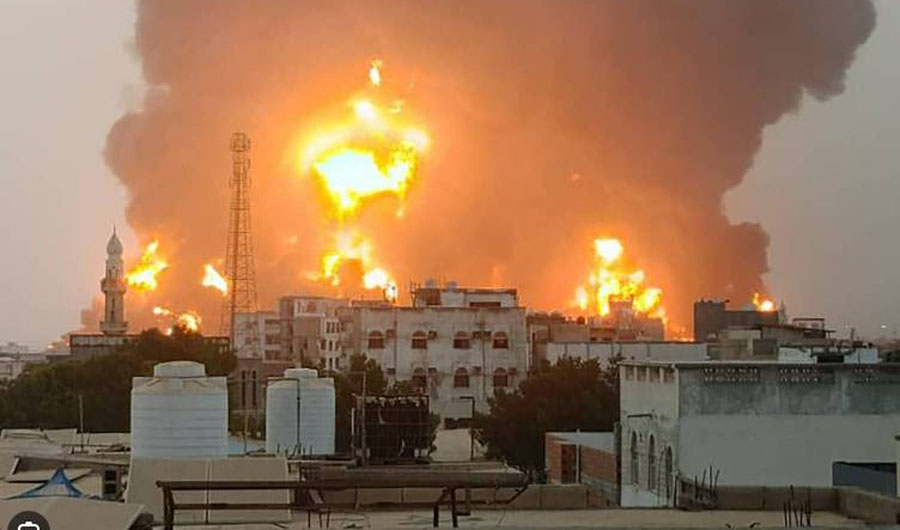
Israel hits ports, energy sites in Yemen after missile intercepted
JERUSALEM: Israel said Thursday it struck ports and energy infrastructure it alleges are used by Houthi militants, after intercepting a missile fired by the group.
Israel’s military said it “conducted precise strikes on Houthi military targets in Yemen — including ports and energy infrastructure in Sanaa, which the Houthis have been using in ways that effectively contributed to their military actions.”
The announcement came shortly after Israel said it had intercepted a missile fired from Yemen.
Al-Masira, a media channel belonging to the Houthis, said a series of “aggressive raids” were launched in the Yemeni capital of Sanaa and the port city of Hodeidah.
It reported raids that “targeted two central power plants” in Yemen’s capital Sanaa, while in Hodeidah it said “the enemy launched four aggressive raids targeting the port… and two raids targeting” an oil facility.
The strikes were the second time this week that Israel’s military has intercepted a missile from Yemen.
On Monday, the Houthis claimed a missile launch they said was aimed at “a military target of the Israeli enemy in the occupied area of Yaffa” — a reference to Israel’s Tel Aviv area.
READ ALSO:
- Gaza mediators intensify ceasefire efforts, Israeli strikes kill 20 people
- PDP expels South-East national vice chairperson over anti-party activities
- Your information on $1bn investment misleading, Dangote Refinery replies NNPCL
Also Monday, an Israeli navy missile boat intercepted a drone in the Mediterranean after it was launched from Yemen, the military said.
The Houthi militants have said they are acting in solidarity with Palestinians and pledged Monday to continue operations “until the aggression on Gaza stops and the siege is lifted.”
On December 9, a drone claimed by Houthis exploded on the top floor of a residential building in the central Israel city of Yavne, causing no casualties.
In July, a Houthi drone attack in Tel Aviv killed an Israeli civilian, prompting retaliatory strikes on the Yemeni port of Hodeidah.
The Houthis have also regularly targeted shipping in the Red Sea and the Gulf of Aden, leading to retaliatory strikes on Houthi targets by United States and sometimes British forces.
Israeli military spokesman Daniel Hagari said the group had become a “global threat,” pointing to Iran’s support for the militants.
“We will continue to act against anyone, anyone in the Middle East, that threatens the state of Israel,” he said.
Israel hits ports, energy sites in Yemen after missile intercepted
International
Gaza mediators intensify ceasefire efforts, Israeli strikes kill 20 people
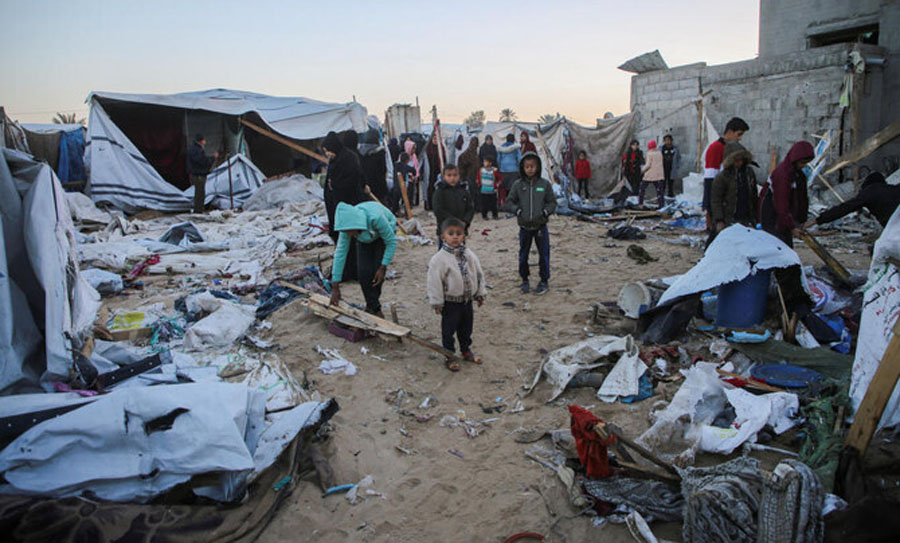
Gaza mediators intensify ceasefire efforts, Israeli strikes kill 20 people
CAIRO: The United States, joined by Arab mediators, sought on Wednesday to conclude an agreement between Israel and Hamas to halt the 14-month-old war in the Gaza Strip where medics said Israeli strikes killed at least 20 Palestinians overnight.
A Palestinian official close to the negotiations said on Wednesday that mediators had narrowed gaps on most of the agreement’s clauses. He said Israel had introduced conditions which Hamas rejected but would not elaborate.
On Tuesday, sources close to the talks in Cairo, the Egyptian capital, said an agreement could be signed in coming days on a ceasefire and a release of hostages held in Gaza in return for Palestinian prisoners held by Israel.
Medics said an Israeli airstrike killed at least 10 people in a house in the northern town of Beit Lahiya while six were killed in separate airstrikes in Gaza City, Nuseirat camp in central areas, and Rafah near the border with Egypt.
In Beit Hanoun in the northern Gaza Strip, medics said four people were killed in an airstrike on a house. There was no immediate comment from the Israeli military spokesman.
Israeli forces have operated in the towns of Beit Hanoun and Beit Lahiya as well as the nearby Jabalia camp since October, in a campaign the military said aimed to prevent Hamas militants from regrouping.
Palestinians accuse Israel of carrying out acts of “ethnic cleansing” to depopulate the northern edge of the enclave to create a buffer zone. Israel denies it.
READ ALSO:
- PDP expels South-East national vice chairperson over anti-party activities
- Your information on $1bn investment misleading, Dangote Refinery replies NNPCL
- Many die at Ibadan children’s Christmas party stampede, organisers arrested
Hamas does not disclose its casualties, and the Palestinian health ministry does not distinguish in its daily death toll between combatants and non-combatants.
On Wednesday, the Israeli military said it struck a number of Hamas militants planning an imminent attack against Israeli forces operating in Jabalia.
Later on Wednesday, Muhammad Saleh, director of Al-Awda Hospital in Jabalia, said Israeli shelling in the vicinity damaged the facility, wounding seven medics and one patient inside the hospital.
The Israeli military had no immediate comment.
In the Central Gaza camp of Bureij, Palestinian families began leaving some districts after the army posted new evacuation orders on X and in written and audio messages to mobile phones of some of the population there, citing new firing of rockets by Palestinian militants from the area.
CEASEFIRE GAINS MOMENTUM
The US administration, joined by mediators from Egypt and Qatar, has made intensive efforts in recent days to advance the talks before President Joe Biden leaves office next month.
In Jerusalem, Israeli President Isaac Herzog met Adam Boehler, US President-elect Donald Trump’s designated envoy for hostage affairs. Trump has threatened that “all hell is going to break out” if Hamas does not release its hostages by Jan. 20, the day Trump returns to the White House.
CIA Director William Burns was due in Doha on Wednesday for talks with Qatari Prime Minister Sheikh Mohammed bin Abdulrahman Al-Thani on bridging remaining gaps between Israel and Hamas, other knowledgeable sources said. The CIA declined to comment.
Israeli negotiators were in Doha on Monday looking to bridge gaps between Israel and Hamas on a deal Biden outlined in May.
There have been repeated rounds of talks over the past year, all of which have failed, with Israel insisting on retaining a military presence in Gaza and Hamas refusing to release hostages until the troops pulled out.
The war in Gaza, triggered by a Hamas-led attack on communities in southern Israel that killed some 1,200 people and saw more than 250 abducted as hostages, has sent shockwaves across the Middle East and left Israel isolated internationally.
Israel’s campaign has killed more than 45,000 Palestinians, displaced most of the 2.3 million population and reduced much of the coastal enclave to ruins.
Gaza mediators intensify ceasefire efforts, Israeli strikes kill 20 people
ARAB NEWS
-

 Railway20 hours ago
Railway20 hours agoLagos Rail Mass Transit part of FG free train ride – NRC
-

 metro2 days ago
metro2 days agoCourt stops customs from seizing imported rice in open market
-

 metro3 days ago
metro3 days agoFG transfers electricity market regulatory oversight in Lagos to LASERC
-

 metro2 days ago
metro2 days agoIbadan stampede: Tinubu orders probe as death toll hits 40
-

 metro1 day ago
metro1 day agoIbadan stampede: Ooni reacts after arrest of ex-wife
-

 metro2 days ago
metro2 days agoAfe Babalola: Court grants Dele Farotimi bail, barred from media interviews
-

 metro20 hours ago
metro20 hours agoNIMC warns against extortion, reaffirms free NIN enrollment
-

 News2 days ago
News2 days agoAdebayo Ogunlesi, 2 other Nigerians make Forbes 50 wealthiest Black Americans list 2024



